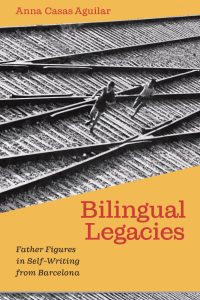Dr. Anna Casas Aguilar, Assistant Professor of Spanish, is publishing a new book titled Bilingual Legacies: Father Figures in Self-Writing from Barcelona (July 2022, University of Toronto Press). Here she elaborates on the inspiration behind it.
About the Book
“Moving beyond the shadow of the dictator, Francisco Franco, this book shows how these authors distinguished between the patriarchal 'father of the nation' and their own paternal figures.”


Book cover of Bilingual Legacies: Father Figures in Self-Writing from Barcelona (July 2022, University of Toronto Press) by Dr. Anna Casas Aguilar. Photograph FFG-80-10 by Antonio Falcó Lana. Col.lecció Antonio Falcó Lana/Institut d’Estudis Fotogràfics de Catalunya.
Bilingual Legacies is a book about fatherhood in the works of several Spanish authors born in Barcelona and raised during Franco’s dictatorship. Drawing from the autobiographical texts of four canonical writers—Juan Goytisolo, Carlos Barral, Terenci Moix, and Clara Janés—Bilingual Legacies explores how these authors understood paternal figures as well as how they positioned themselves vis-à-vis Spanish and Catalan literary traditions.
Moving beyond the shadow of the dictator, Francisco Franco, this book shows how these authors distinguished between the patriarchal “father of the nation” and their own paternal figures. Doing so casts light on how Spaniards’ conceptions of gender, language, and family were complex and illustrates how notions of masculinity, authorship, language, and canon are interrelated.
This book opens new lines of inquiry and research for two topics that have not always been studied as interrelated: fatherhood and bilingualism. It goes beyond the idea that there is a natural link between the mother and our first language, what we popularly call “the mother tongue”, and explores a somehow opposite concept, that of “the father tongue”.
In this sense, the book contributes to a broader understanding of bilingualism, family, writing and literature, particularly in Spain in the late 20th century, as well as to the study of masculinity and language by focusing on father figures. The book also offers a new approach to study the literature of Barcelona during the Transition to Democracy, and it offers an innovative reading of authors born in Catalonia who published in Spanish or both in Spanish and Catalan.
Inspiration
“In many ways, this book was born of my own bilingualism and the fascination I felt when reading authors who described their bilingual upbringing in Barcelona—particularly those who had experienced the Francoist repression of the Catalan language and culture.”
During the dictatorship of Francisco Franco, Catalan culture and language were repressed and silenced, but did not fully disappear; many families maintained the Catalan language and culture in the private sphere. A generation of authors, including Clara Janés, Carlos Barral or Terenci Moix, chose to write and to publish mainly in Spanish.
The prevalence of Spanish, however, does not mean that Catalan was not central in their writings and their work. Even the authors who did not speak Catalan at home, and who chose to write and publish only in Spanish (like Juan Goytisolo), were influenced by being raised in a diglossic context (a context where one language is understood as the language of culture and the state and the other as the language of family or private use) and acknowledge that it in their autobiographies.
The four authors I study started publishing their autobiographies after 1975, that is, after the death of Francisco Franco, and they all speak at length about their relationship with Catalan—even if they do so in Spanish. If we look closely at their autobiographies, Franco is not the most important ‘paternal’ nor masculine figure, but the father and other male figures are central, which speaks about a revision of forms of masculinity during this time period.
One book that I study in my monograph, Jardín y laberinto (Garden and Labyrinth, 1990) by Clara Janés, also needs to be acknowledged as the first seed for this project. When I first read it, I was fascinated by how Janés talked about and organized the memories of her father, the Catalan publisher and writer Josep Janés Olivé. Jardín y laberinto is a mesmerizing text where the city of Barcelona and the voices of the women of the family, such as the mother, stand in the foreground in order to recover the image of Josep Janés.
Jardín y laberinto compelled me to find other books and texts with similar themes, where other images of fathers and a linguistic inheritance spoke to the unresolved tension of gender identity, to the process of negotiation with different gender models and cultures, and to the acceptance of a self that might not conform completely with the traditions inherited at home. The ways in which Clara Janés resolved the tension between becoming a female writer in a very masculine literary tradition, symbolized by the father and his work as a publisher and writer, were dazzling to me: the daughter-father relationship is labyrinthine in itself, a reality epitomized by Jardín y laberinto—a book marked by its circular structure.
Acknowledgment
This book has been with me since 2010 when I began writing my PhD thesis at the University of Toronto. It travelled with me to several places in North America until I arrived at UBC. Many people supported me during all these years: my husband, my family, my friends, my PhD committee, my colleagues at the University of British Columbia, the Peter Wall Institute for Advanced Studies, the reviewers of the book, the members of the North American Catalan Society, and many others! This book is here thanks to the many people who offered a helping hand.


